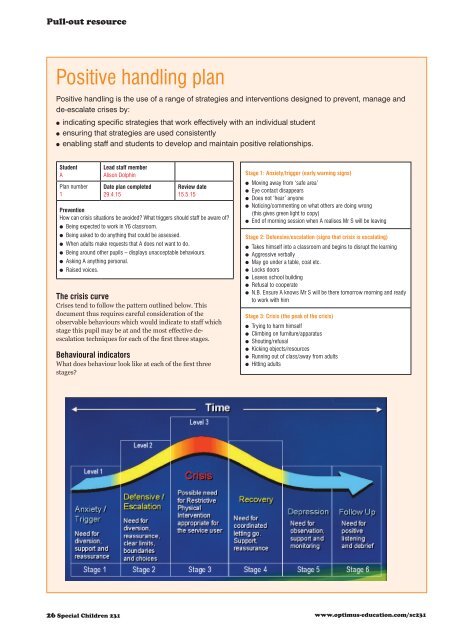champions
1H1C301qFr9
1H1C301qFr9
You also want an ePaper? Increase the reach of your titles
YUMPU automatically turns print PDFs into web optimized ePapers that Google loves.
Pull-out resource<br />
Positive handling plan<br />
Positive handling is the use of a range of strategies and interventions designed to prevent, manage and<br />
de-escalate crises by:<br />
●●<br />
indicating specific strategies that work effectively with an individual student<br />
●●<br />
ensuring that strategies are used consistently<br />
●●<br />
enabling staff and students to develop and maintain positive relationships.<br />
Student<br />
A<br />
Plan number<br />
1<br />
Lead staff member<br />
Alison Dolphin<br />
Date plan completed<br />
29.4.15<br />
Review date<br />
15.5.15<br />
Prevention<br />
How can crisis situations be avoided? What triggers should staff be aware of?<br />
●●<br />
Being expected to work in Y6 classroom.<br />
●●<br />
Being asked to do anything that could be assessed.<br />
●●<br />
When adults make requests that A does not want to do.<br />
●●<br />
Being around other pupils – displays unacceptable behaviours.<br />
●●<br />
Asking A anything personal.<br />
●●<br />
Raised voices.<br />
The crisis curve<br />
Crises tend to follow the pattern outlined below. This<br />
document thus requires careful consideration of the<br />
observable behaviours which would indicate to staff which<br />
stage this pupil may be at and the most effective deescalation<br />
techniques for each of the first three stages.<br />
Behavioural indicators<br />
What does behaviour look like at each of the first three<br />
stages?<br />
Stage 1: Anxiety/trigger (early warning signs)<br />
●●<br />
Moving away from ‘safe area’<br />
●●<br />
Eye contact disappears<br />
●●<br />
Does not ‘hear’ anyone<br />
●●<br />
Noticing/commenting on what others are doing wrong<br />
(this gives green light to copy)<br />
●●<br />
End of morning session when A realises Mr S will be leaving<br />
Stage 2: Defensive/escalation (signs that crisis is escalating)<br />
●●<br />
Takes himself into a classroom and begins to disrupt the learning<br />
●●<br />
Aggressive verbally<br />
●●<br />
May go under a table, coat etc.<br />
●●<br />
Locks doors<br />
●●<br />
Leaves school building<br />
●●<br />
Refusal to cooperate<br />
●●<br />
N.B. Ensure A knows Mr S will be there tomorrow morning and ready<br />
to work with him<br />
Stage 3: Crisis (the peak of the crisis)<br />
●●<br />
Trying to harm himself<br />
●●<br />
Climbing on furniture/apparatus<br />
●●<br />
Shouting/refusal<br />
●●<br />
Kicking objects/resources<br />
●●<br />
Running out of class/away from adults<br />
●●<br />
Hitting adults<br />
26 Special Children 231 www.optimus-education.com/sc231


